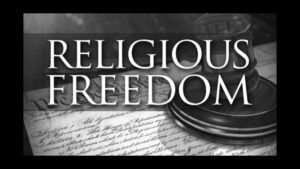Table of Contents
INTRODUCTION
In this Blog, you will get to know all about the right to freedom of Religion. In India, under the articles from 25 to 28 each and every individual has a right to freedom of religion. religion is a matter of personal beliefs and values. And that is why choosing a religion is considered as a fundamental right in India.
What is Secularism?
Secularism means developing, understanding, and respect for different religions. It is believed that the word ‘Secularism’ has its origin in late medieval Europe. In 1948, during the constituent assembly debate, a demand was made by the KT Shah to include the word ‘Secular’ in the Preamble to the Constitution. The members of the assembly though agreed to the secular nature of the constitution but it was not incorporated in the Preamble. Later, in 1976 the Indira Gandhi government enacted the 42nd Amendment Act, and the word ‘Secular’ was added to the Preamble. The 42nd Amendment Act also known as the ‘Mini Constitution, is the most comprehensive amendment to the Constitution

Article – 25 Freedom of conscience and free profession, practice and propagation of religion.
(1) Subject to public order, morality and health and to the other provisions of this Part, all persons are equally entitled to freedom of conscience and the right freely to profess, practice and propagate religion. (2) Nothing in this article shall affect the operation of any existing law or prevent the State from making any law— (a) regulating or restricting any economic, financial, political or other secular activity which may be associated with religious practice; (b) providing for social welfare and reform or the throwing open of Hindu religious institutions of a public character to all classes and sections of Hindus. Explanation I.—The wearing and carrying of kirpans shall be deemed to be included in the profession of the Sikh religion. Explanation II.—In sub-clause (b) of clause (2), the reference to Hindus shall be construed as including a reference to persons professing the Sikh, Jaina or Buddhist religion, and the reference to Hindu religious institutions shall be construed accordingly
Article 25 guarantees the freedom of conscience, the freedom to profess, practice, and propagate religion to all citizens.
- The above-mentioned freedoms are subject to public order, health, and morality.
- This article also gives a provision that the State can make laws:
- That regulates and restricts any financial, economic, political, or other secular activity associated with any religious practice.
- That provides for the social welfare and reform or opening up of Hindu religious institutions of a public character to all sections and classes of Hindus. Under this provision, Hindus are construed as including the people professing the Sikh, Jain, or Buddhist religions, and Hindu institutions shall also be construed accordingly.
- People of the Sikh faith wearing & carrying the kirpan shall be considered as included in the profession of the Sikh religion
Article -26 Freedom to manage religious affairs
Subject to public order,morality and health, every religious denomination or any section thereof shall have the right—
(a) to establish and maintain institutions for religious and charitable purposes;
(b) to manage its own affairs in matters of religion;
(c) to own and acquire movable and immovable property; and
(d) to administer such property in accordance with law.
Article – 27 Freedom as to payment of taxes for promotion of any particular religion
No person shall be compelled to pay any taxes, the proceeds of which are specifically appropriated in payment of expenses for the promotion or maintenance of any particular religion or religious denomination
According to Article 27 of the Constitution, there can be no taxes, the proceeds of which are directly used for the promotion and/or maintenance of any particular religion/religious denomination
Article – 28 Freedom as to attendance at religious instruction or religious worship in certain educational institutions
(1) No religious instruction shall be provided in any educational institution wholly maintained out of State funds. (2) Nothing in clause (1) shall apply to an educational institution which is administered by the State but has been established under any endowment or trust which requires that religious instruction shall be imparted in such institution. (3) No person attending any educational institution recognised by the State or receiving aid out of State funds shall be required to take part in any religious instruction that may be imparted in such institution or to attend any religious worship that may be conducted in such institution or in any premises attached thereto unless such person or, if such person is a minor, his guardian has given his consent thereto
This article permits educational institutions that are maintained by religious groups to disseminate religious instruction.
- This provides that no religious instruction shall be provided in State-run educational institutions.
- Educational institutions administered by the State but that were established under any endowment or trust which requires that religious instruction shall be imparted in such institutions are exempt from the above clause (that no religious instruction shall be provided).
- Any person who attends any educational institution recognized by the State or receiving State aid shall not be required to participate in any religious instruction that may be imparted in such institution, or also attend any religious worship in such institutions unless he/she has given consent for the same. In the case of minors, the guardians should have given consent for the same.
MUST READ
THE CONSTITUTION OF INDIA – PART 1
CITIZENSHIP-PART 2 THE CONSTITUTION OF INDIA
FUNDAMENTAL RIGHTS-ARTICLE 14 TO 18 (PART 3)
